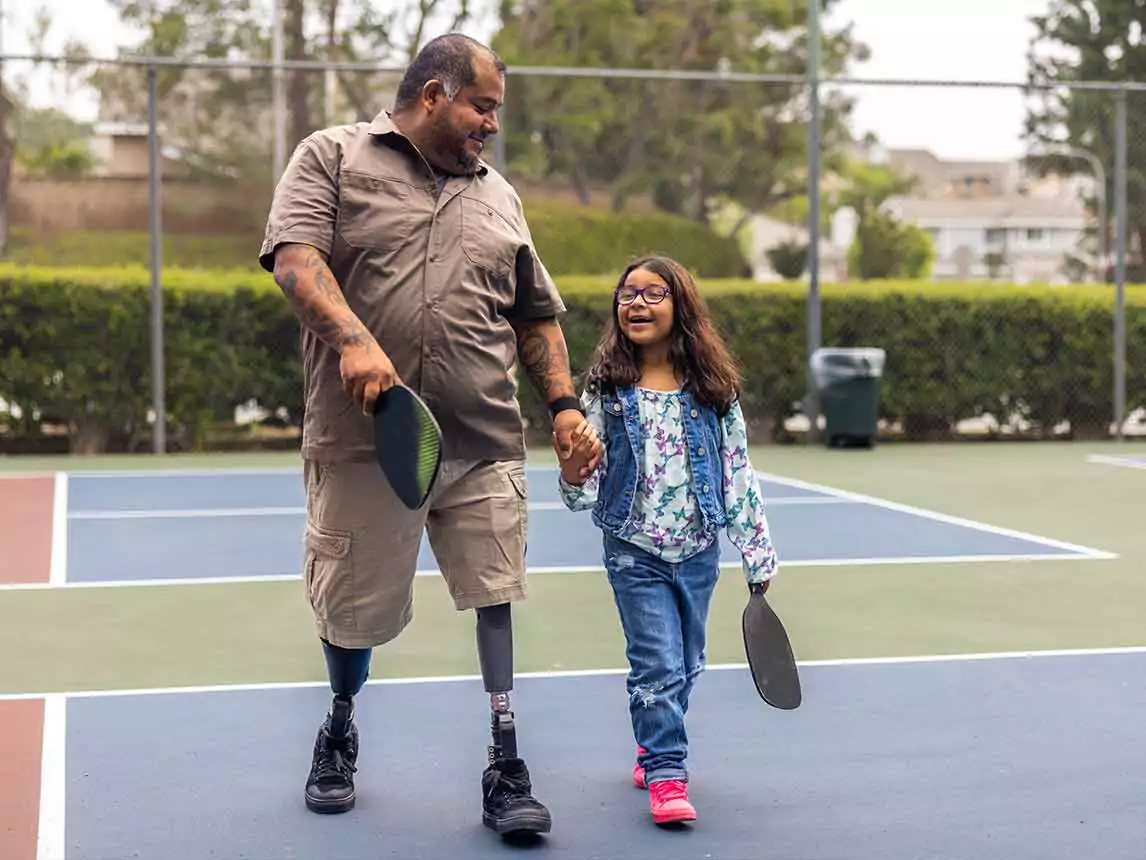It’s no secret that the transition from military to civilian life can be challenging, especially if the job-related skills a military member has honed and developed during service don’t translate directly into available jobs.
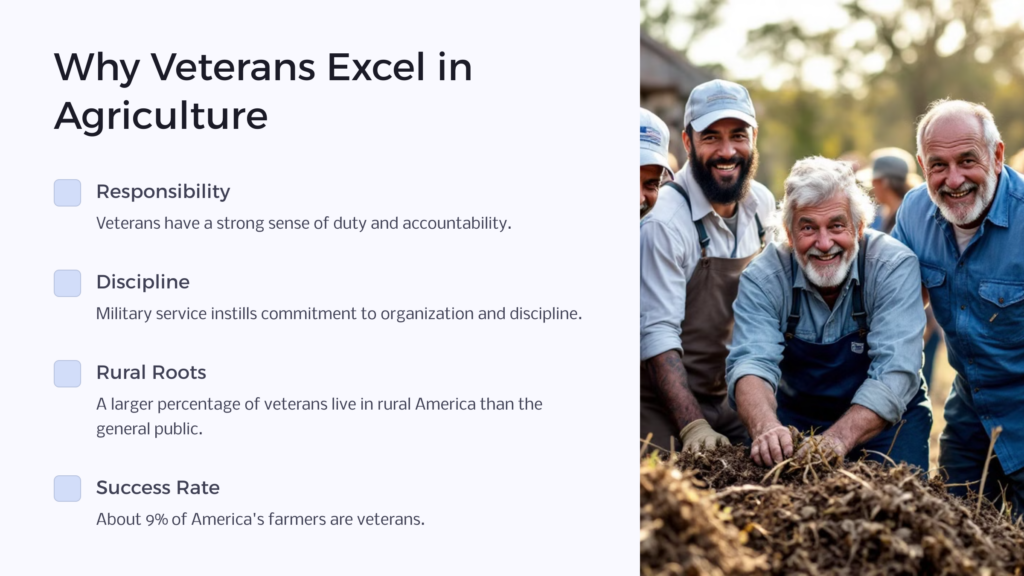
The U.S. Department of Agriculture has long recognized that U.S. veterans are successful small business owners and attractive members of the workforce. To encourage more U.S. veterans from rural communities to pursue post-service careers in agricultural fields, the USDA has launched its highly successful USDA Veterans Initiative.
7 USDA Entrepreneurial Programs for Veterans
- SCORE
- Transition Incentives Program
- Crop Insurance
- Noninsured Crop Disaster Assistance Program
- Agricultural Conservation Easement Program
- Farm Loan Program
- Environmental Quality Incentives Program
The U.S. government has a long history of helping veterans find their career paths once they have separated from military service. Many federal departments, including the U.S. Department of Defense and the U.S. Department of Veterans Affairs, along with many state-level agencies, have put in place a great number of programs and initiatives that support veterans as they transition from military service to a second career. Not least among them is the USDA’s Veterans Initiative.
The USDA has recognized that the skill sets learned during military service often match the characteristics associated with a successful agricultural professional. These traits include a sense of responsibility and accountability, a strong sense of duty, and a commitment to organization and discipline. Many veterans transition easily into ranching, farming, and other agricultural opportunities. Today, roughly 9% of America’s farmers are veterans.
What Is the USDA Veterans Initiative?
Through its Veterans Initiative, the USDA seeks to help veterans transition into ranching, farming, and other agricultural opportunities by connecting them with educational, financial, and training resources – including business planning. According to U.S. Census Bureau data, a larger percentage of veterans live in rural America than members of the general public.
The USDA is poised to make sure that veterans who want to return to rural family farms or start a farm business after military service have access to the tools and opportunities they need to succeed.
The USDA supports veterans through outreach programs in three separate areas: employment, education, and entrepreneurship. The USDA prioritizes hiring veterans because of their wide range of experiences and strong work ethic. Much like the VA pension and VA disability programs, the USDA provides a link to help make sure veterans can financially support themselves when their military service is finished.
USDA Employment Benefits for Veterans
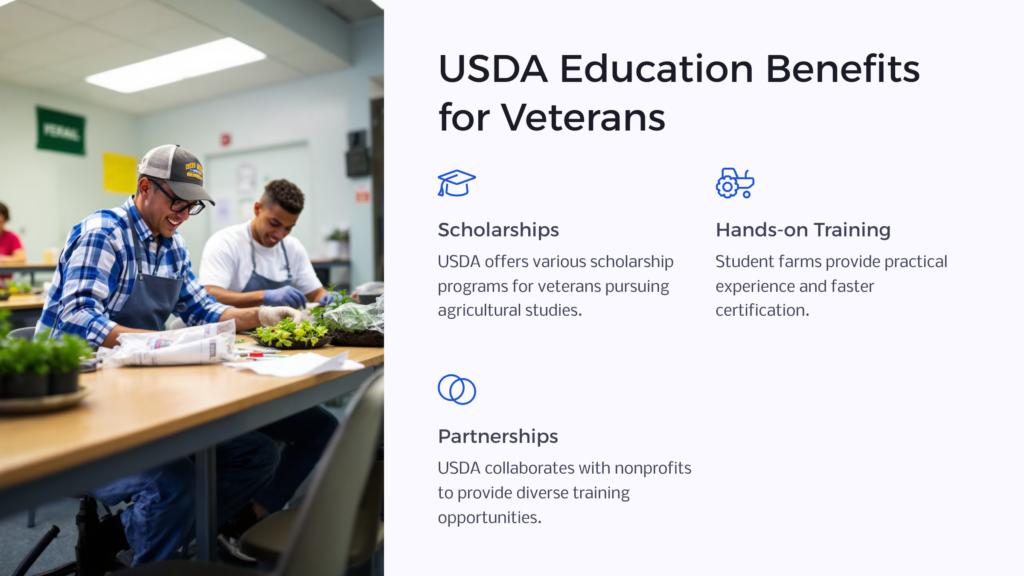
The USDA prioritizes hiring veterans for positions at its more than 2,100 county offices across the United States and/or at USDA headquarters in Washington, D.C. USDA vocational roles that benefit from veterans’ military experience include criminal justice, soil conservation, contracting and procurement, information technology, food inspection and public health, firefighting, finance, and economics.
The USDA supports veterans who seek agricultural careers through hands-on job training in areas like the USDA’s Agricultural Marketing Service or its Wildland Firefighters. Through the USDA Agricultural Commodity Grader Apprenticeship, veterans can spend 12 months immersed in learning about agricultural commodity grading, which is one of the AMS’ top mission-critical occupations.
The Wildland Firefighters apprenticeship program also allows veterans to participate in education, training, and paid work experience of 3,000 hours in preparation for becoming journey-level Wildland Firefighter Specialists. In addition, the Department of Defense’s SkillBridge program allows eligible service members to participate in on-the-job industry training during the last few months of their military career.
USDA Education Benefits for Veterans
Job opportunities in areas like food, agriculture, renewable natural resources, and the environment continue to grow and be vital to the world’s survival and success. Veterans who choose post-military study in fields like plant science, organic agriculture, food science, sustainable biomaterials, precision agriculture, and veterinary medicine will not only find themselves in high demand but also may be eligible for a wide variety of scholarship programs through the USDA.
These services are offered in addition to typical VA education benefits received through the U.S. Department of Veterans Affairs.
Many veterans choose to further their careers by earning their certification by working on a student farm. This route may prove faster than pursuing a college degree and can also provide hands-on training and education.
The USDA also works with several interagency and nonprofit partners to bring education and training opportunities to veterans who need them. For example, the National Center for Appropriate Technology provides sustainable farming internships and apprenticeships. The center’s Armed to Farm program provides veterans with training that ranges from conference presentations to two-day workshops and week-long training events.
Armed to Farm has supported more than 800 veterans from 45 states with hands-on and classroom learning opportunities. Covered topics include how to make a business plan, market products, access USDA programs, set business goals, and pursue mentorships with seasoned farmers – all since its inception in 2013.
Another key USDA partnership is with the Farmer Veteran Coalition, which is the nation’s largest nonprofit organization founded to help veterans begin successful careers in agriculture. Through a modest grant program, the Farmer Veteran Coalition gives direct financial assistance to veterans who are just starting out in farming or ranching. Typical grant amounts range from $1,000-5,000.
7 USDA Entrepreneurial Programs for Veterans
The USDA offers many different entrepreneurial programs for U.S. veterans. Although some of these programs are not necessarily limited to U.S. veterans, they do represent tremendous resources that can help veterans with their farming and ranching businesses.
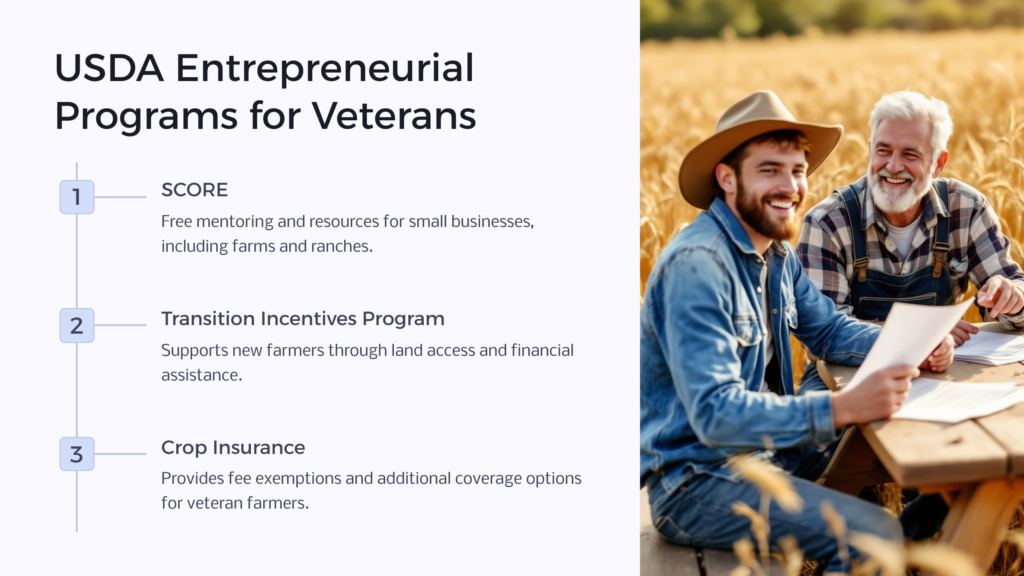
1. SCORE
SCORE is the nation’s largest network of volunteers and expert business mentors solely dedicated to helping small businesses, including farms and ranches, get started and achieve their goals. Through a partnership between SCORE and the USDA, veterans can connect with free support and resources that include everything from financial guidance and growth strategies to business planning.
SCORE provides support for new farmers through mentoring and one-on-one business coaching, workshops on a wide range of topics, online resources that can serve as a playbook, and providing step-by-step outlines for successful business strategies. New veteran farmers can get in-person support through the USDA’s network of service centers, where they can find answers to agricultural questions and an introduction to other support programs.
2. Transition Incentives Program
The Transition Incentives Program provides support and financial assistance to farmers who are just starting out, including veterans. Through this program, land owners can receive two additional annual rental payments on land that’s enrolled in an expiring Conservation Reserve Program contract. To qualify the landowners must sell or rent the land to a beginning farmer or socially disadvantaged group.
Land owners are incentivized to return land to crop production consistently with established conservation practices while providing a viable opportunity for new ranchers and farmers.
3. Crop Insurance
The 2018 Farm Bill provides a series of new benefits for military veterans with farms or ranches who need federal crop insurance coverage. These veterans benefits include some exemptions from fees and additional coverage options.
In particular, the Farm Bill provided the following new benefits for U.S. veterans:
- An exemption from administrative fees related to catastrophic and additional coverage policies
- An extra 10% premium subsidy for applicable additional coverage policies
- The ability to use another owner’s production history for a specific acreage that was transferred to veterans who previously were instrumental in decision-making or physical activities associated with crop production on that acreage
- An increase in yield adjustment from 60% to 80% of applicable transitional yield
Administered through the USDA’s Risk Management Agency, these additional benefits provide access to higher levels of insurance coverage.
4. Noninsured Crop Disaster Assistance Program
The Noninsured Crop Disaster Assistance Program provides financial support for producers of non-insurable crops during times of natural disaster that lead to low yields, loss of inventory or prevention of planting. Most landowners, tenants, or sharecroppers who assume part of the risk associated with eligible crop products are eligible for this program, including U.S. veterans starting out in the farm business. However, the landowner, tenant, or sharecropper must show an annual adjusted gross income of less than $900,000 to be eligible for the program.
Eligible causes of crop loss under this program include drought, freeze, hail, excessive moisture, excessive wind or hurricanes, earthquake, flood, excessive heat, plant disease, volcanic smog, or insect infestation, to name a few.
5. Agricultural Conservation Easement Program
The Agricultural Conservation Easement Program protects both agricultural viability and conservation values of eligible parcels of land by limiting the nonagricultural uses to which those land parcels can be employed.
The goal is to prevent land-related activities that may negatively affect its viable agricultural use and conservation values. This may entail limiting the land’s grazing use and protecting, restoring, and enhancing wetlands wherever possible on eligible land.
For example, through its land easements, the program protects croplands and grasslands on working farms and ranches by limiting non-agricultural uses. Through its Wetlands Reserve Easements, the program helps private and tribal landowners protect, restore and enhance wetlands that previously have been degraded from agricultural use.
6. Farm Loan Program
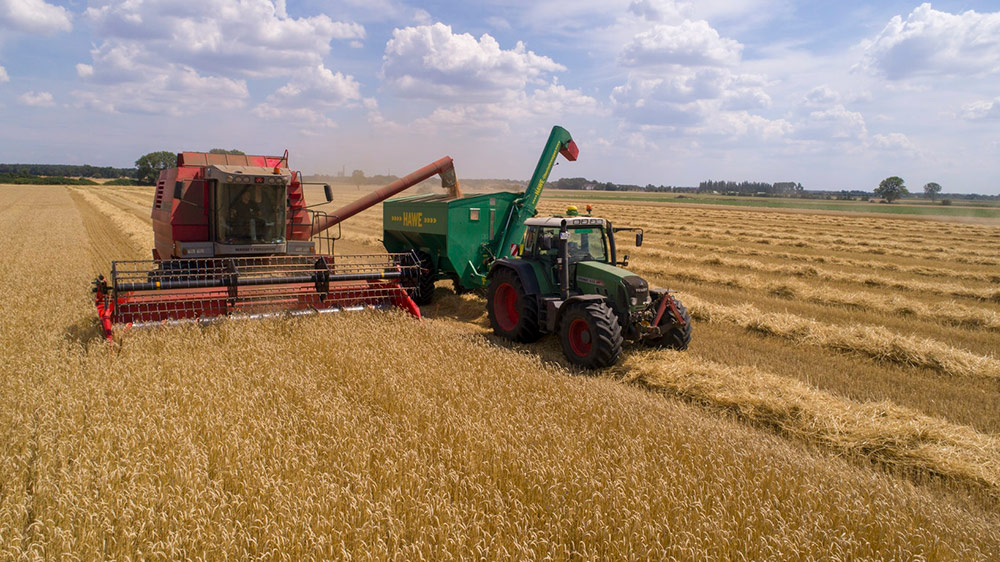
The Farm Loan Program helps farmers and ranchers get the funding they need to start, expand, or maintain a family farm. Loan types include operating loans, farm ownership loans, microloans, youth loans, Native American tribal loans, emergency loans, targeted loans, and direct or guaranteed loans. There also are loans specifically for beginning farmers, along with loan options for minority-owned and women-owned farms.
Unlike a traditional lender or VA loan, the loans obtained through the Farm Loan Program are designed to be temporary, with the goal of helping farmers graduate to commercial credit. Veterans who are starting out in farming can qualify for this program as a beginning farmer or rancher as long as they began farming or ranching within the last 10 years.
7. Environmental Quality Incentives Program
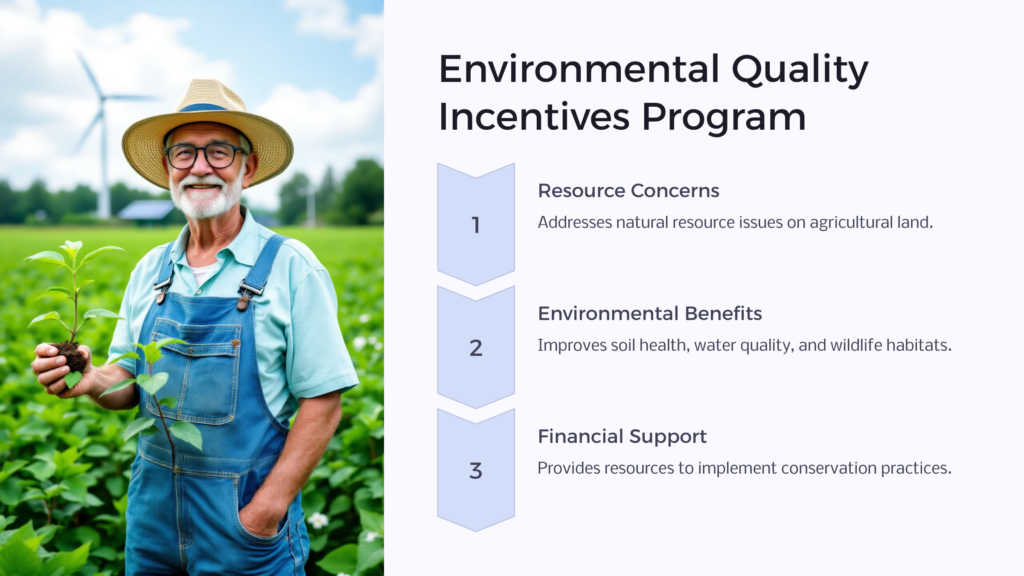
Through the Natural Resources Conservation Service, this program helps agricultural producers and non-industrial forest managers address concerns around natural resources and deliver environmental benefits.
Such benefits may include increased soil health, improved water and air quality, reduced soil erosion and sedimentation, improved or created wildlife habitat, conserved ground and surface water, and mitigation against drought and increasing weather volatility. NRCS provides agricultural producers and non-industrial forest managers with the financial resources and support they need to plan and implement agricultural improvements or conservation practices.
Understanding the USDA Veterans Initiative
The U.S. Department of Agriculture’s commitment to America’s veterans and military families is strong, as evidenced by the selection of support and training programs the USDA makes available to veterans.
If you are a U.S. veteran either returning home to a rural area or looking to move to a more rural setting, it’s worth taking the time to explore opportunities available within the high-demand fields of farming, ranching, and other agricultural industry roles. By taking advantage of these USDA resources, you can establish a new career that makes effective use of the skills you developed during your time of military service.
 Benefits.com Advisors
Benefits.com Advisors
With expertise spanning local, state, and federal benefit programs, our team is dedicated to guiding individuals towards the perfect program tailored to their unique circumstances.
Rise to the top with Peak Benefits!
Join our Peak Benefits Newsletter for the latest news, resources, and offers on all things government benefits.
















